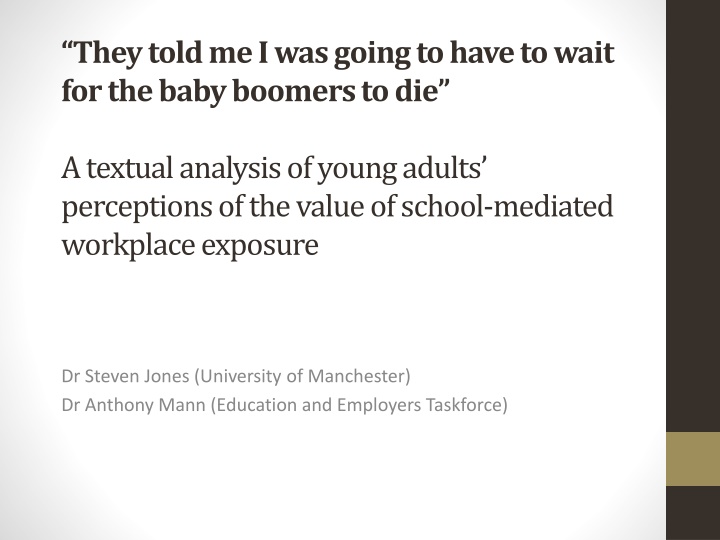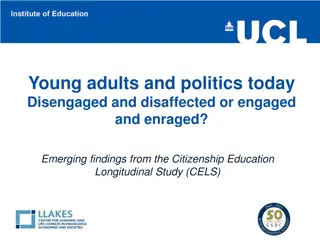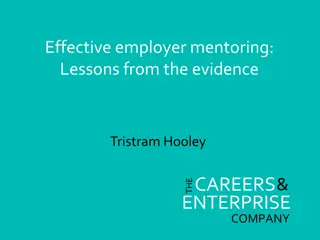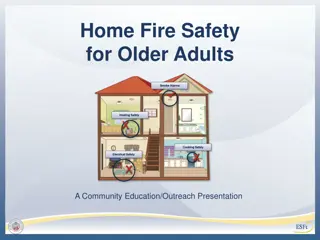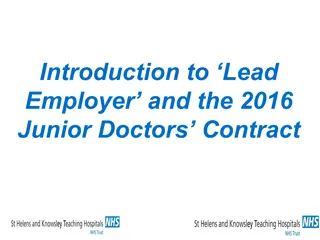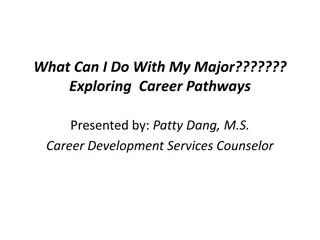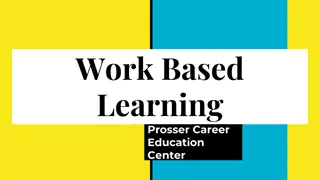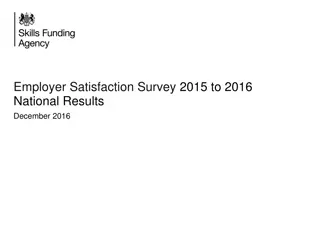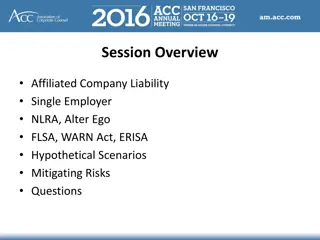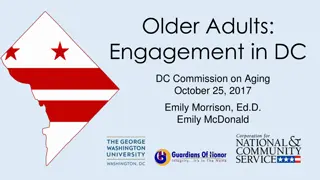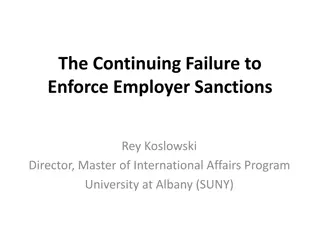Importance of Employer Engagement in Education for Young Adults' Career Development
Young adults' perceptions of workplace exposure through school-mediated programs play a crucial role in their transition to the labor market. This text discusses the significance of employer engagement in education, emphasizing the benefits of work experience, career guidance, and school-age employer contacts. Research studies show that such engagements lead to improved labor market prospects and higher wage premiums for young adults. Initiatives like the English work experience requirement aim to equip students with employability skills for future success.
Download Presentation

Please find below an Image/Link to download the presentation.
The content on the website is provided AS IS for your information and personal use only. It may not be sold, licensed, or shared on other websites without obtaining consent from the author.If you encounter any issues during the download, it is possible that the publisher has removed the file from their server.
You are allowed to download the files provided on this website for personal or commercial use, subject to the condition that they are used lawfully. All files are the property of their respective owners.
The content on the website is provided AS IS for your information and personal use only. It may not be sold, licensed, or shared on other websites without obtaining consent from the author.
E N D
Presentation Transcript
They told me I was going to have to wait for the baby boomers to die A textual analysis of young adults perceptions of the value of school-mediated workplace exposure Dr Steven Jones (University of Manchester) Dr Anthony Mann (Education and Employers Taskforce)
Employer engagement in education: becoming a norm of education policy The English work experience requirement After years of employer engagement becoming ever more commonplace within British secondary education, with the introduction of the Wolf reforms in 2013, a period of work experience has become a legal requirement of all (English) educational provision at 16-19. International endorsement: OECD Individual career guidance should be a part of a comprehensive career guidance framework, including a systematic career education programme to inform students about the world of work and career opportunities. This means that schools should encourage an understanding of the world of work from the earliest years, backed by visits to workplaces and workplace experience. Partnerships between schools and local firms allow both teachers and students to spend time in workplaces. (OECD 2010, 85)
Why engage employers in education? Primarily, to improve the labour market prospects of young people: Scottish Executive (2007) Determined to Succeed (2004) calls for a major commitment from Scotland s employers to help young people get ready for work and go on to be successful employees, employers and entrepreneurs Welsh Assembly Government (2004) statutory requirement to work-related education designed to provide opportunities for learners to improve their knowledge and understanding of, and skills for, the world of work, enterprise and entrepreneurship English Department for Children, Schools and Families (2008) work-related learning at Key Stage 4 to help young people aged 14 to 16 to develop their employability skills that make them attractive to their future employers
Research studies: suggest school-age employer contacts linked to comparative success in early labour market Four US longitudinal studies of learning programmes with control groups rich in employer engagement and work related learning : early adult labour market wage premiums of 6.5% to 25% one to six years after leaving high school (Jobs for the Future 1998; Applied Research Unit of Montgomery County Public Schools 2001; MacAullum et al. 2002; Kemple with Willner 2008). Mann and Percy (2013), young adults aged 19-24 in full-time employment enjoy wage premiums of up to 18% linked to higher volumes of school-mediate employer contacts Percy and Mann (2014), young adults aged 19-24 with higher levels of school-age employer contacts experience NEET rates up to 20% lower than comparable peers with low level of engagement. Crawford et al (2011), young people who combine FT education with PT work at 16/17 do better in employment at 18/19 than peers who just study PT Teenage access to networks of people in employment correlated with better employment outcomes as young adults in US (McDonald et al., 2007) and Finnish studies (Jokisaari & Nurmi, 2005).
Politicians agree, researchers endorse, but lack of certainty why and how employer engagement in education should be a good thing US studies typically vague on causes of premiums observed. They could be improved career awareness and development activities (Kemple and Willner 2008, 40). enhanced career preparation which allow programme graduates to make immediate tangible steps towards careers goals (MacAullum et al. 2002, 11, 13).
Three theories of change Human, social and cultural capital theory offering potential explanatory frameworks for assessing school-mediated employer engagement, providing potential means of understanding both how employer engagements are experienced and how they might influence potential economic outcomes. Stanley, J. & Mann, A. (2014) A theoretical framework for employer engagement in Mann, A., Stanley, J. & Archer, L. eds. Understanding employer engagement in education: theories and evidence (London: Routledge)
Environmental factors contributing to capital formation Family Peer Group Locality Gender Ethnicity Other institutions School Work Educational Career Employer interventions contributing to capital formation Employer Engagement 1 Employer Engagement 2 Employer Engagement 3
Human capital (Becker) Department for Education (2013) Post-16 work experience as part of 16 to 19 study programmes Human capital accumulation That as a result of the employer engagement, young people improve their ability to contribute to the production of goods and services in employment. This may include: Development of technical skills Development of employability skills (UKCES definition): Self-management Thinking and solving problems Working together and communicating Understanding the business Using numbers effectively Using language effectively Using IT effectively Demonstrating a positive approach In her review of vocational education Professor Wolf described the unique role that time spent with an employer can have in helping young people develop employability skills and the value that employers place on this when they are assessing young people for employment in the future.
Social capital (Granovetter, Portes) Social capital accumulation That as a result of the employer engagement, young people come into contact with another individual or group of individuals creating a social relationship which in some way afford or constrain the ability of the young person to achieve goals of economic relevance. This may include: Gaining access to new information about employment opportunities and recruitment demands (non-redundant trusted information) Validating/confirming previously held perspectives on employment opportunities and recruitment demands Securing new access to economic opportunities through newly formed or strengthened social relations Raffo & Reeves (2000) on extended work experience the process of developing social capital through trustworthy reciprocal social relations within individualized networks, young people are provided with an opportunity to gain information, observe, ape and then confirm decisions and actions with significant others and peers.
Cultural capital (Bourdieu) Cultural capital accumulation That as a result of the employer engagement, young people experience change in their attitudes about themselves and the lives they expect to lead. This may include: Examples of changes in habitus : attitudes, dispositions feelings that career paths are or are not for me Examples where the employer engagement leads to a changed perspective about the value and point of education/schooling and qualifications Clarke & Zukas (2013), A Bourdieusian approach to understanding employability: becoming a fish in water Journal of Vocational Education and Training King s College/Louise Archer, ASPIRES (2013) science for me / not for me Miller (1998), Green & Rogers (1997), mentoring and changed attitudes to education
Research Questions Can the testimonies of young British adults shed light on which, if any, of these theories of change help to explain what may happen when a young person engages with employers as part of their educational experiences? Do the testimonies of young British adults help us understand how social background influences experience of employer engagements? Can theories of symbolic capital help to shape policy and allow more young people to benefit from employer engagement?
Data and Method Of the 1,002 total YouGov respondents, 488 responded to: Thinking back to your time in school or college, what would you say you got out of employers being involved in your education? It could be in terms of changing the way you thought about school or college, providing useful information or encouragement for thinking about possible jobs or careers, helping to get actual jobs either through people you got to know or giving you something useful for job applications or interviews, or in getting into a course at college or university you really wanted. Or maybe you got nothing out of it at all. Either way, please tell us more. (150 words max) Of these 488, 380 indicated in their comments that they had had some contact with employers at school. Of these 380, 190 (50.0%) indicated that they had found this contact helpful in some way
Useful Employer Contact? 100% 90% 80% No (%) 70% 60% Yes (%) 50% 40% 30% 20% 10% 0% Non-Selective State Schools Grammar Schools and Selective State Schools Independent Schools
School Type Coding Non-Selective State Schools Grammar Schools and Selective State Schools Independent Schools
Positives (across all school types): # Social Capital networks and contacts Gained contacts. Personal contacts were helpful. It was useful to talk to employers. The ability to network and make contacts.
Positives (across all school types): # Social Capital - Authentic Guidance Told us from experience. Told us straight. Opportunity to ask questions without prejudice. You got advice that seemed more genuine. I trusted the word of someone in the working world as opposed to a careers advisor or teacher telling you what to do. They told me that I was going to have to wait for the baby boomers to die.
Positives (across all school types): # Cultural Capital: Enhanced Personal Confidence Making you feel more confident. Helped me a lot by boosting my confidence. Helped develop my confidence. The excitement of being independent.
Positives (particular to Grammar Schools, Selective State Schools and Independent Schools) # Human Capital: Links to Higher Education Helped me to gain experience which I used in my university application. Helped get into university. Context for what university courses you should look for. Helped me to better prepare for my interviews for university. Helped me when I went on to a degree.
Positives (particular to Non-Selective State Schools) # Cultural Capital: Elimination of Options Made me realise what profession I did not want to go into. I did work experience at a hairdressers. It made me realise that I wanted to go to university so that I got a good job and didn t have to fall back on boring jobs like hairdressing. It made me realise which types of job I didn t want Showed my which careers I definitely did not want to do. Helped me to decide that it wasn t what I wanted to go into.
Positives (particular to Non-Selective State Schools) # Cultural Capital: Academic Motivation My work experience placement made me determined to work hard in education and aim for a worthwhile job I will enjoy. I found my work experience horrible, which is why I made an effort to get a better education and a better job. It stopped me from leaving school early.
Positives (particular to Independent Schools) # Social Capital: access to advantageous labour market experience Following my work experience placement I obtained permanent part-time work at the same business. This steady job helped as a stepping stone into the working world. It definitely helped me get summer internships during my degree, which will give me an advantage in the job market when I finish.
% likelihood of different capitals being referenced in statements 40 Non-Selective State Schools 35 30 25 Grammar Schools and Selective State Schools 20 15 Independent Schools 10 5 0 Human Capital Social Capital Cultural Capital
Negatives (across all school types): # Lack of Relevance Wasn t linked to the career I was interested in. Never in the field I wanted to work in. I worked in a bookshop doing the jobs no-one else wanted. This did not affect my decision to become a diagnostic radiographer. I folded letters and put them into envelopes for a solicitors. I now do a PhD in astrophysics.
Negatives (particular to Non-Selective State Schools) # Under-stimulation/Exploitation The only experience I had was when I was 15 with Woolworths. It was rubbish. I stacked shelves and that was it. [My placement] was in Mickey D s. Hell personified. It was more an excuse to have somebody work for them for free. I worked in a shoe shop and had to do all of the rubbish jobs for free. The employer just used me as free labour.
Wider issues raised by those from Non- Selective State Schools I gained very little from the types of employer contact we had at school, as they were very much targeted towards people who were not academically capable and who wouldn t be going on to university. Focused on business/vocations, not on the professions (e.g. law, medicine, accountancy). [I gained] nothing, as those that visited were recruiting from the army. Misbehaved children were given the opportunity to do more work placements so they could build up their CV [This] often left well- behaved children feeling like if you misbehaved you were rewarded.
Useful Theoretical Perspectives Life-course Analysis (Pallas 2003): Not all young people are equally equipped to deploy their work experience as a launch pad (Evans, Schoon and Weale, 2010: 38) for HE entry, career building, etc. Social Capital Donors (Portes 1998): Differences arise between those who provide resources ( donors ), possibly leading to different conceptualisations of employer engagement. Class-matching or Class-reproducing Activity (Hatcher & Le Gallais 2008): Recurring perception that school-mediated employer engagement focuses less on academic routes and tends to operate outside of the professions.
Rethinking Capital? Authenticity (trusted routes to social and cultural capital): Strong, widely-shared perception that workplace staff communicate more directly and truthfully about labour market realities: trustworthy reciprocal social relations (Raffo & Reeves, 2000). Game-playing insights ( socialised human capital): Accumulation of invisible human capital more common than direct, technical skills (Kemple and Willner 2008, 40). Elimination and Motivation ( negatively accumulated cultural capital): Enhanced agency to reject some vocational options and re-engage with academic routes, especially for those in the non-selective state sector.
Policy Perspectives? Employability and technical skills: can t be assumed It should not be taken for granted that young people will build or feel that they can describe - any human capital development gained through their employer engagements. What is the optimal way to deliver work-relevant skills? Self-conceptions: start early Young people form and change attitudes about themselves and their places in the world through their youth beginning exposure to potential futures at a young age is likely to increase opportunity to gain insights of value to emerging self-conceptions and sense of agency. You don t know what you don t know: more is more Employer engagement often highly effective in influencing young people ruling in and ruling out potential pathways. Preceding attitudes influence patterns of engagement, calling for managed experiences, where broader early exposure is mandated and later focused exploration is facilitated.
Thank you Steve Jones SJ@manchester.ac.uk Anthony Mann Anthony.Mann@educationandemployers.org
